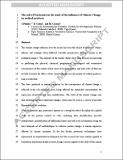Por favor, use este identificador para citar o enlazar a este item:
http://hdl.handle.net/10261/48390COMPARTIR / EXPORTAR:
 SHARE SHARE
 CORE
BASE CORE
BASE
|
|
| Visualizar otros formatos: MARC | Dublin Core | RDF | ORE | MODS | METS | DIDL | DATACITE | |

| Campo DC | Valor | Lengua/Idioma |
|---|---|---|
| dc.contributor.author | Piñeiro, Carmen | - |
| dc.contributor.author | Cañas, Benito | - |
| dc.contributor.author | Carrera, Mónica | - |
| dc.date.accessioned | 2012-04-17T10:57:28Z | - |
| dc.date.available | 2012-04-17T10:57:28Z | - |
| dc.date.issued | 2010 | - |
| dc.identifier.citation | Food Research International 43(7): 1791-1802 (2010) | es_ES |
| dc.identifier.issn | 0963-9969 | - |
| dc.identifier.uri | http://hdl.handle.net/10261/48390 | - |
| dc.description | 1 figura, 2 tablas | es_ES |
| dc.description.abstract | The climatechangeinfluence over the oceans has been the subject of numerous articles informs and strategies from different scientific perspectives, focused mainly in the ecological impact. The majority of the related studies have been focused in measuring or predicting the physical, chemical, geographical, sociological and economical consequences of this reality, which seems to be unstoppable, and only a few of them are devoted to detect the effects of the climatechange over the quality of seafood products, wild or cultivated. The stress produced in marine organisms by the consequences of climatechange is reflected at the cell molecular level, being affected the metabolite concentration, the expression of proteins and their modifications. The study of the climatechange may take advantage of these molecular changes, which may be used as a source of possible biomarkers of its evolution. After the genomic age, proteomics appears as a young but robust discipline for a global study of the protein content in cells, including their identification, possible modifications, quantification of differential expression and tissue localization, being the most adequate set of methodologies to evidence protein changes in marine organisms affected by climate variations. In the last decade proteomic technologies have experienced an exponential development, but the research has been mainly applied to biomedical and human health research, being scarcely focused to the study of the marine environment. The application of the proteomics methods to study the effects of climatechange over seafood, mainly from the safety point of view, is reviewed | es_ES |
| dc.language.iso | eng | es_ES |
| dc.publisher | Elsevier | es_ES |
| dc.rights | openAccess | es_ES |
| dc.subject | Proteomics | es_ES |
| dc.subject | Seafood | es_ES |
| dc.subject | Climate change | es_ES |
| dc.subject | Food safety | es_ES |
| dc.title | The role of proteomics in the study of the influence of climate change on seafood products | es_ES |
| dc.type | artículo | es_ES |
| dc.identifier.doi | 10.1016/j.foodres.2009.11.012 | - |
| dc.description.peerreviewed | Peer reviewed | es_ES |
| dc.relation.publisherversion | http://dx.doi.org/10.1016/j.foodres.2009.11.012 | es_ES |
| dc.identifier.e-issn | 1873-7145 | - |
| dc.type.coar | http://purl.org/coar/resource_type/c_6501 | es_ES |
| item.cerifentitytype | Publications | - |
| item.languageiso639-1 | en | - |
| item.openairecristype | http://purl.org/coar/resource_type/c_18cf | - |
| item.grantfulltext | open | - |
| item.fulltext | With Fulltext | - |
| item.openairetype | artículo | - |
| Aparece en las colecciones: | (IIM) Artículos | |
Ficheros en este ítem:
| Fichero | Descripción | Tamaño | Formato | |
|---|---|---|---|---|
| Role proteomics.pdf | 595,94 kB | Adobe PDF |  Visualizar/Abrir |
CORE Recommender
SCOPUSTM
Citations
25
checked on 16-may-2024
WEB OF SCIENCETM
Citations
20
checked on 28-feb-2024
Page view(s)
344
checked on 19-may-2024
Download(s)
403
checked on 19-may-2024
Google ScholarTM
Check
Altmetric
Altmetric
NOTA: Los ítems de Digital.CSIC están protegidos por copyright, con todos los derechos reservados, a menos que se indique lo contrario.
